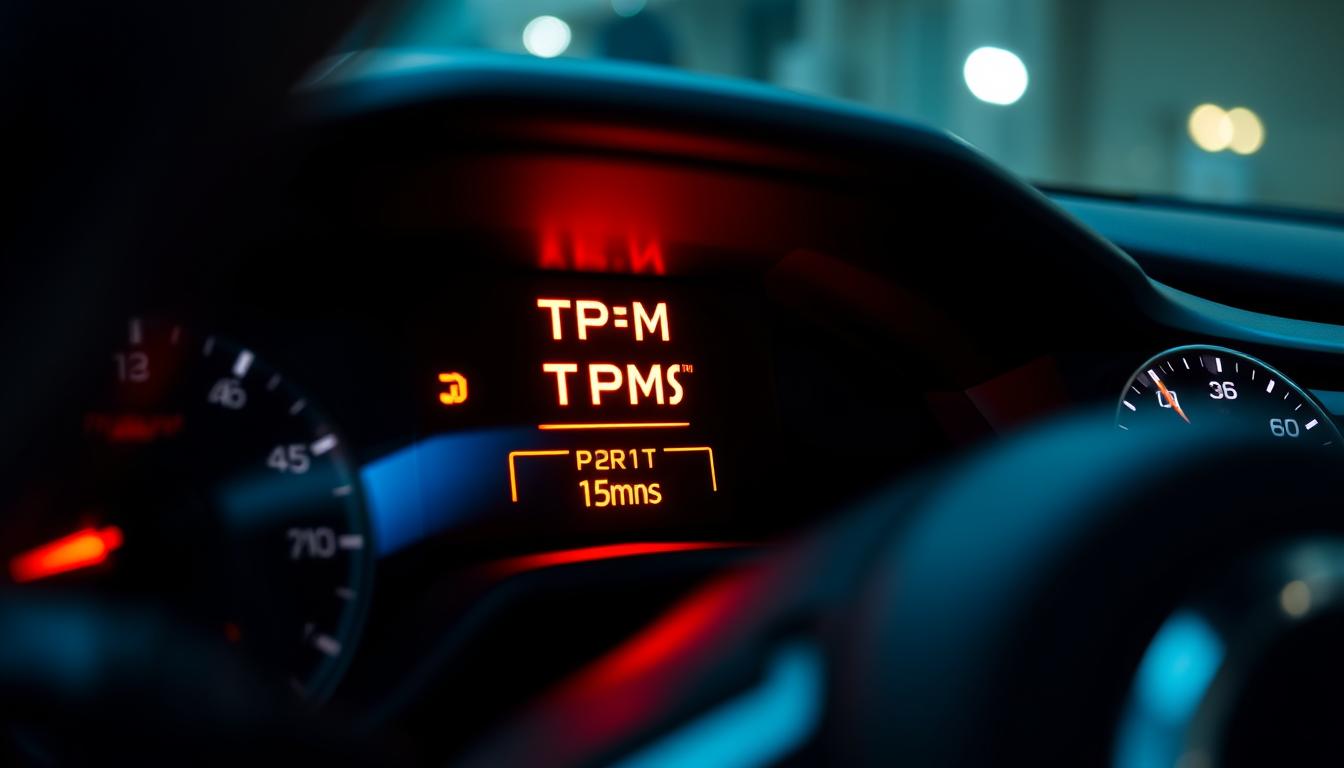As a Nissan Altima owner, seeing a TPMS error can be really frustrating. The TPMS system is key for safety, warning drivers about tire pressure problems. These problems can cause accidents and damage your car. If you see a TPMS error in your Nissan Altima, it’s important to fix it fast to stay safe.
The US government made TPMS systems mandatory in cars under 10,000lbs since 2007. This shows how important this safety feature is.
A TPMS warning in your Nissan Altima can happen for many reasons. This includes low tire pressure, sensor problems, or system errors. Knowing why and how to fix these issues is crucial for your car’s health and your safety.
With the right tools and knowledge, you can find and fix TPMS problems. This keeps your Nissan Altima running well and efficiently.
Seeing a TPMS light, whether steady or blinking, means you need to act. Not fixing a TPMS error can cause more problems. This includes worse fuel efficiency, uneven tire wear, and a higher risk of accidents. By fixing TPMS errors quickly, you avoid these issues and keep your car in great shape.
Key Takeaways
- TPMS systems are mandatory in all passenger vehicles under 10,000lbs gross weight produced after September 2007.
- A TPMS error Nissan Altima can be triggered by low tire pressure, sensor malfunctions, or system errors.
- Understanding the causes of TPMS errors is crucial for maintaining your vehicle’s health and your safety on the road.
- Ignoring a TPMS error can lead to decreased fuel efficiency, uneven tire wear, and increased risk of accidents.
- Addressing TPMS errors promptly can prevent further complications and ensure your Nissan Altima remains in top condition.
- A Nissan Altima TPMS warning can be resolved by diagnosing and fixing the underlying issue, ensuring your safety on the road.
Understanding Your Nissan Altima’s TPMS System
Your Nissan Altima has a Tire Pressure Monitoring System (TPMS) for better tire performance and safety. Knowing how this system works is key to fixing any TPMS problems your Altima might have.
What is TPMS?
TPMS stands for Tire Pressure Monitoring System. It checks your Altima’s tire air pressure all the time. It warns you if the pressure gets too low. This system helps with better fuel use, handling, and safety.
How TPMS Works in Nissan Altima
The Nissan Altima has a direct TPMS system. Each wheel has its own sensor that sends tire pressure info to the car’s computer. If the pressure is low, a warning light on the dashboard helps you fix the problem.
Types of TPMS Sensors Used
Nissan Altima uses two main types of TPMS sensors:
- Direct TPMS: These sensors are inside each tire and measure air pressure directly.
- Indirect TPMS: This system checks wheel speed and guesses tire pressure based on that.
| TPMS Type | How It Works | Advantages | Disadvantages |
|---|---|---|---|
| Direct TPMS | Uses sensors in each tire to provide real-time pressure data. | Accurate pressure readings, immediate alerts. | More expensive, sensors can wear out. |
| Indirect TPMS | Monitors wheel speed to detect pressure changes. | Cheaper to implement, no sensors needed inside tires. | Less precise, can be affected by other factors. |
Common Causes of TPMS Error Nissan Altima
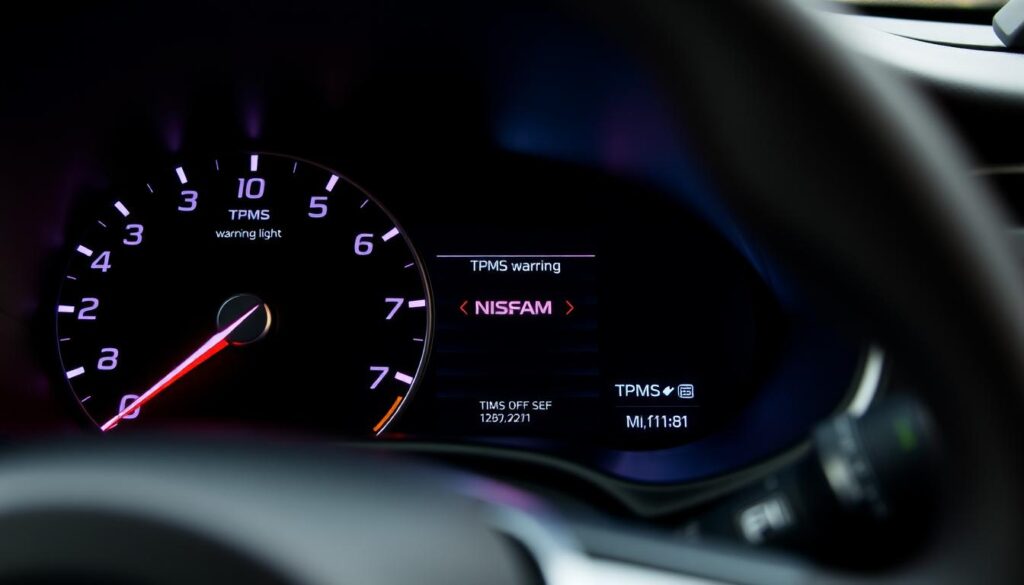
A Nissan Altima tire pressure sensor error can come from many issues. These problems can affect the car’s safety and how well it runs. Knowing what causes these errors is key to keeping your car safe and running right.
- Low Tire Pressure: Under-inflated tires are a big reason for TPMS errors. Low pressure can cause tires to blow out, make driving less safe, and use more gas.
- Faulty TPMS Sensors: Sometimes, sensors just stop working right. This can happen if they get damaged or wear out, leading to wrong readings and a warning light.
- Weak Sensor Batteries: The batteries in TPMS sensors can get weak over time. When this happens, the sensors fail, and you get error messages.
- System Malfunctions: Problems with the TPMS system itself can also cause errors. This includes software bugs or wiring issues that keep showing the error light.
Checking your tire pressure often and making sure sensors are working can stop these errors. If the warning light stays on even when your tires are fine, it’s best to get a pro to check it out.
Identifying Different TPMS Warning Signs
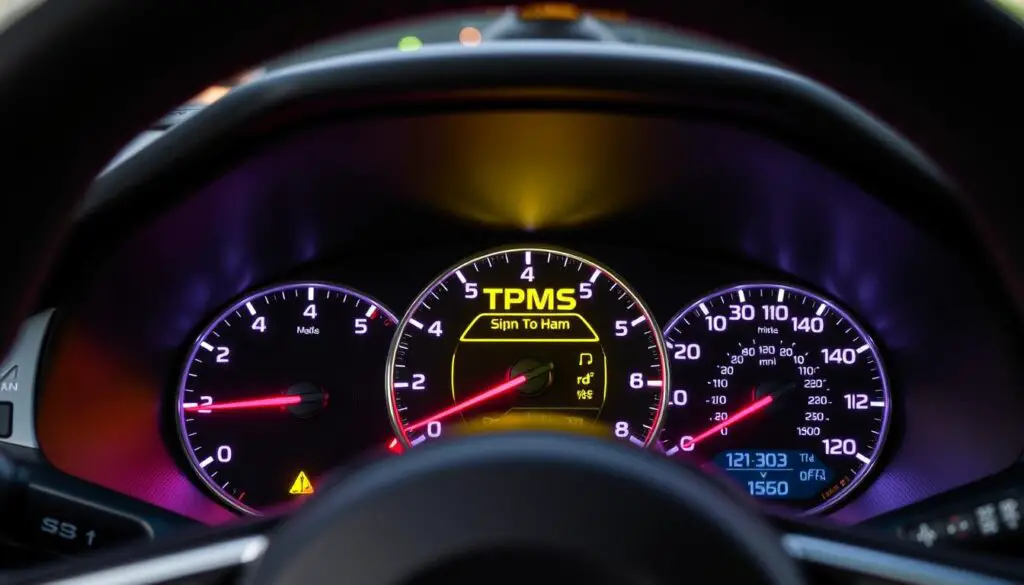
It’s important to know the different TPMS warning signs to keep your Nissan Altima safe and running well. Spotting these signs early can help fix Altima TPMS malfunction problems fast.
Solid Light vs. Blinking Light
A steady TPMS light means there’s a general problem or underinflated tires. But, a flashing light warns of a serious issue, like a tire losing air fast or a sensor not working right.
Dashboard Warning Messages
If your Altima TPMS malfunction shows up, your dashboard will tell you. You might see “Check Tire Pressure” or “TPMS Fault.” These messages help you understand the problem and fix it.
Associated Warning Sounds
Some TPMS problems make sounds. For example, a beep might mean your tire pressure is dropping fast. This sound tells you to check your tires right away for safe driving.
Being alert and knowing these warning signs helps you handle Altima TPMS malfunction issues. This keeps your vehicle safe and in top shape.
Quick Diagnostic Steps for TPMS Issues
Seeing a TPMS error on your Nissan Altima can be worrying. Follow these quick steps to find and fix common problems.
- Visual Inspection: First, check all tires for damage or wear. Make sure each tire is at the right pressure.
- Pressure Check: Use a good tire pressure gauge to check each tire’s psi. The wrong pressure often causes TPMS warnings.
- Retrieve DTC Codes: Use a diagnostic tool like the VT56. Choose the “Service” icon, then enter your car’s details. Go to the DTC code icon to get specific TPMS error codes.
- Analyze Codes: Look up the DTC codes in your car’s manual or online. This will tell you what the TPMS problem is.
- Reset the System: After fixing any problems, reset the TPMS system with the OBDII module. You might need to do a relearn procedure for accurate sensor readings.
These steps can help you fix TPMS error on Nissan Altima and keep your car’s safety systems working right. If you still have issues, get help from a professional mechanic.
How Temperature Affects TPMS Readings
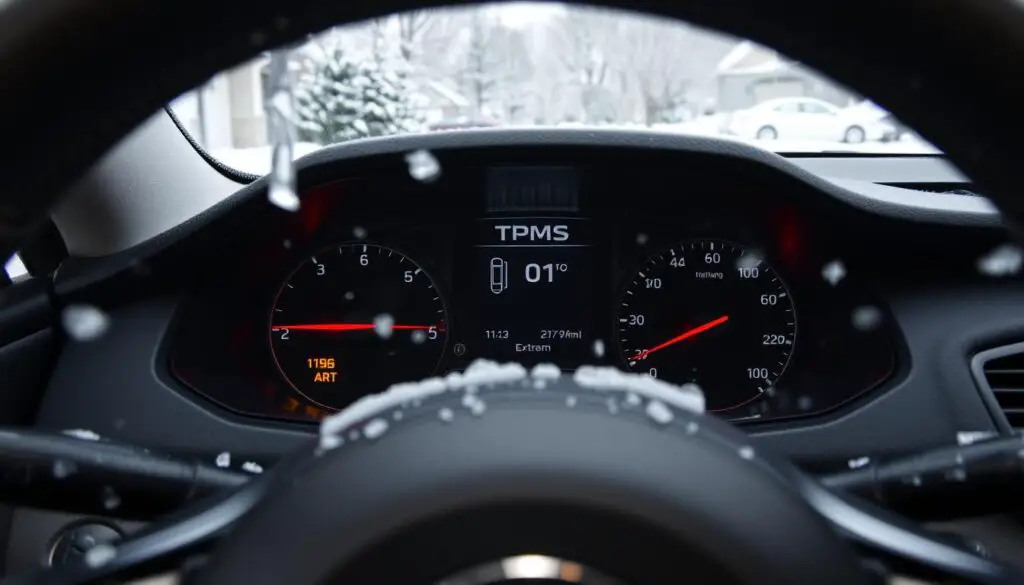
Temperature changes can affect your TPMS error Nissan Altima. As the seasons change, so does your tire pressure. This can trigger TPMS warnings.
Seasonal TPMS Variations
Different seasons impact tire pressure in various ways:
- For every 10-degree drop in temperature, tire pressure can decrease by about 1 PSI.
- Winter temperatures can reduce tire pressure by up to 10 PSI.
- Regular monthly checks are recommended during colder months to maintain optimal pressure.
Temperature-Related False Alerts
Changes in temperature can sometimes cause false TPMS error Nissan Altima alerts. These alerts may not always indicate a genuine issue with your tires.
- Pressure drops during autumn can mimic slow leaks or punctures.
- Using a spare tire may disable certain TPMS sensors, leading to warnings.
Understanding these factors can help you determine when a TPMS warning is a real concern or just a result of temperature changes.
| TPMS Code | Meaning |
|---|---|
| 15 | Front Left Tire Pressure Below 26 PSI |
| 16 | Front Right Tire Pressure Below 26 PSI |
| 17 | Rear Right Tire Pressure Below 26 PSI |
| 18 | Rear Left Tire Pressure Below 26 PSI |
| 21 | Front Left Sensor Data Transmission Issue |
| 22 | Front Right Sensor Data Transmission Issue |
| 23 | Rear Right Sensor Data Transmission Issue |
| 24 | Rear Left Sensor Data Transmission Issue |
| 31 | Front Left Sensor Checksum Data Malfunction |
| 32 | Front Right Sensor Checksum Data Malfunction |
| 33 | Rear Right Sensor Checksum Data Malfunction |
| 34 | Rear Left Sensor Checksum Data Malfunction |
Resetting Your Altima’s TPMS System
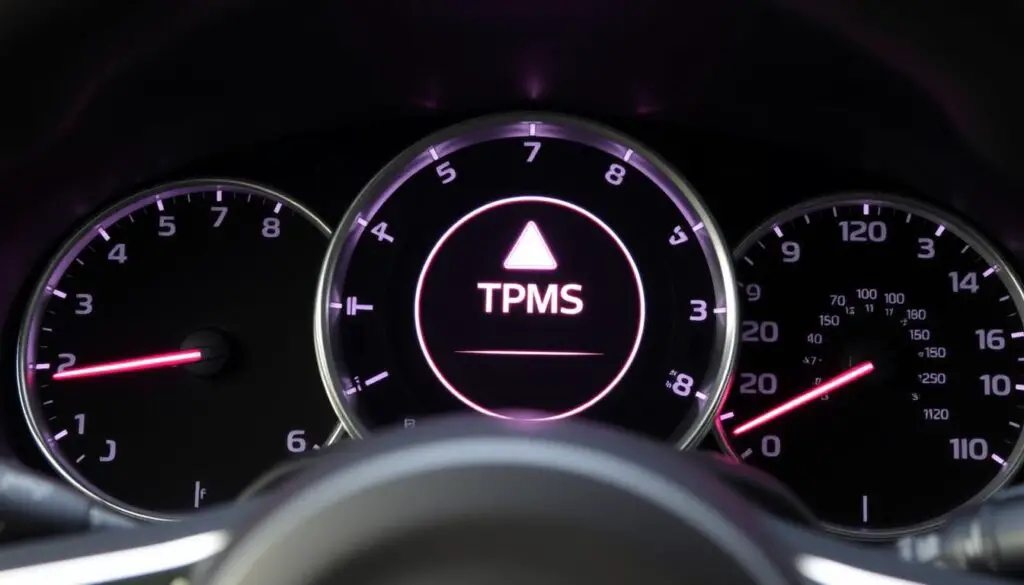
Seeing a Nissan Altima TPMS warning means it’s time to reset the system. This keeps your vehicle’s tire pressure monitoring accurate. Resetting is key to getting reliable safety info.
- Driving Method: Drive your Nissan Altima at 50 mph or higher for at least 10 minutes. This helps the TPMS sensors recalibrate and recognize the correct tire pressure.
- Refill Method: Inflate all tires to the recommended PSI. Once the tires are properly inflated, restart your vehicle. The TPMS warning should turn off automatically.
- Direct Sensor Reset: Use the TPMS reset button located under the steering wheel or consult your owner’s manual for specific instructions. You can also use a TPMS tool to reset each sensor manually.
If the Nissan Altima TPMS warning stays on, there might be a problem like a faulty sensor. In such cases, getting professional help is a good idea. This ensures your TPMS works right.
| Method | Steps | Pros | Cons |
|---|---|---|---|
| Driving Method | Maintain 50 mph for 10 minutes | Easy and no tools required | Requires specific driving conditions |
| Refill Method | Inflate tires to recommended PSI and restart | Ensures proper tire pressure | Only effective if pressure is correct |
| Direct Sensor Reset | Use reset button or TPMS tool | Manual and precise | May need special tools |
When to Replace TPMS Sensors
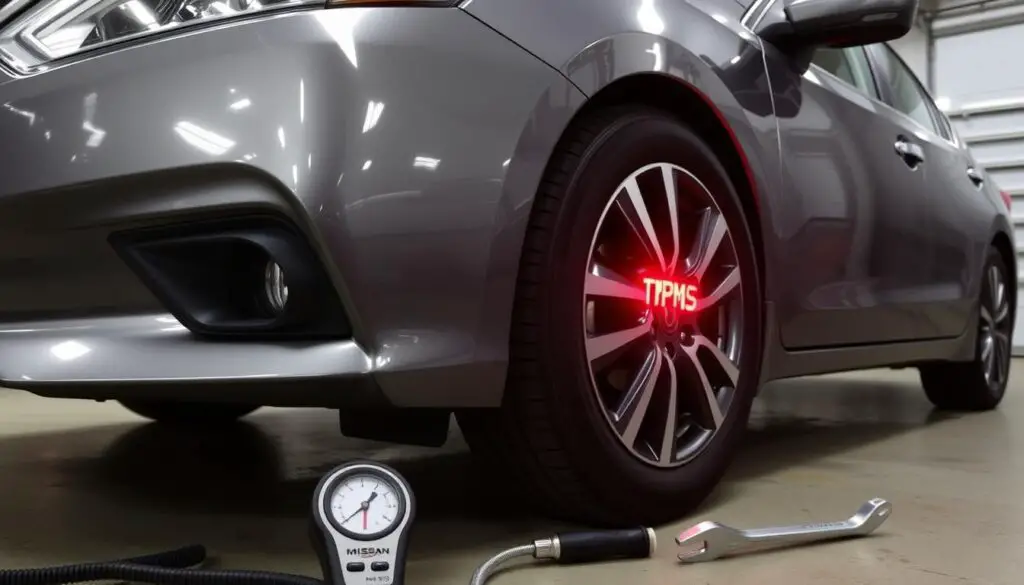
Keeping your Nissan Altima’s TPMS in check is key for safe driving. Knowing when to swap out TPMS sensors can dodge unexpected errors and keep your car running smoothly.
Average Sensor Lifespan
TPMS sensors in the Altima usually last 5 to 7 years. Since the battery in each sensor can’t be replaced, a weak battery means you need a new sensor. If one sensor goes bad, the others might fail soon if they’re the original ones.
Signs of Sensor Failure
- Warning Light Activation: A steady or flashing TPMS light on your dashboard hints at trouble.
- Inconsistent Tire Pressure: If your tire pressure keeps changing, it could mean your sensors are not working right.
- Delayed System Response: If the TPMS takes too long to alert you to pressure changes, it might be failing.
Replacement Costs and Options
Replacing TPMS sensors can cost differently. New sensors usually cost between $80 and $100 each. You can buy them from Nissan or through other tire and wheel shops. Also, getting a pro to install them is a good idea to make sure they’re set up right.
| Replacement Option | Cost Range (USD) | Details |
|---|---|---|
| OEM Sensors | $80 – $100 | Original Nissan sensors ensure compatibility and reliability. |
| Aftermarket Sensors | $60 – $90 | Generally cheaper, but check if they fit your Altima model. |
| Professional Installation | $50 – $100 | Includes sensor programming and system reset. |
Professional vs. DIY TPMS Maintenance
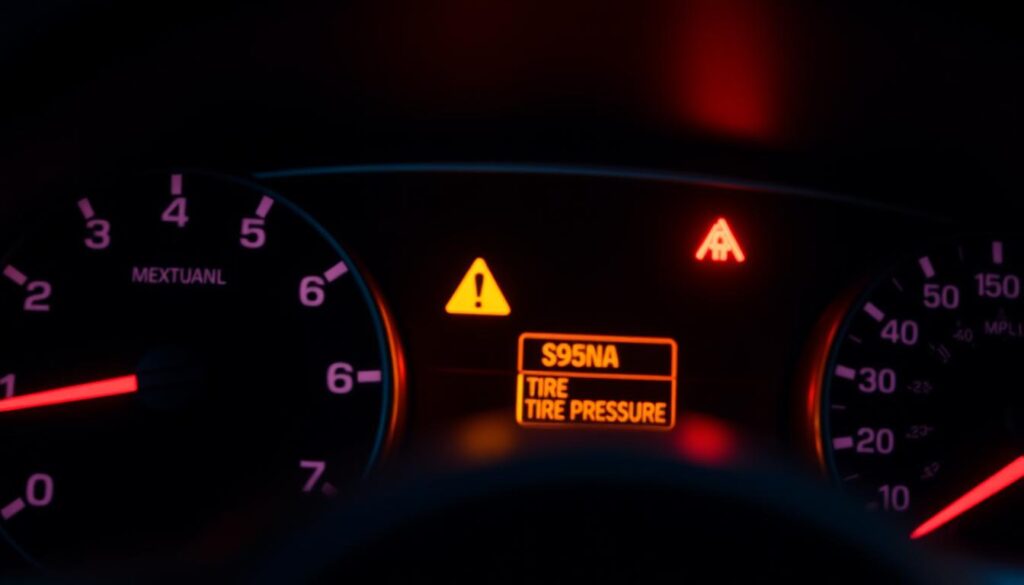
When you get a Nissan Altima tire pressure sensor error, you might wonder if you should fix it yourself or go to a mechanic. Knowing the good and bad of each option can help you decide.
Professional Maintenance: A certified mechanic can give you a precise fix. They have the tools and know-how to tackle tough problems, keeping your car safe.
- Pros:
- Accurate troubleshooting and repairs
- Access to specialized equipment
- Warranty on services provided
- Cons:
- Higher cost compared to DIY
- Requires scheduling and time
DIY Maintenance: If you’re good at basic car care, you can tackle simple TPMS problems at home. Tasks like resetting the TPMS or checking tire pressure are easy to do without a mechanic.
- Pros:
- Lower cost
- Immediate action without waiting for appointments
- Cons:
- Limited by available tools and knowledge
- Risk of improper handling leading to bigger issues
Choosing between DIY and a mechanic depends on your comfort, budget, and the problem’s complexity. For complex issues or if the problem keeps coming back, a mechanic is best. They ensure your car stays safe and runs well.
Preventing Future TPMS Problems
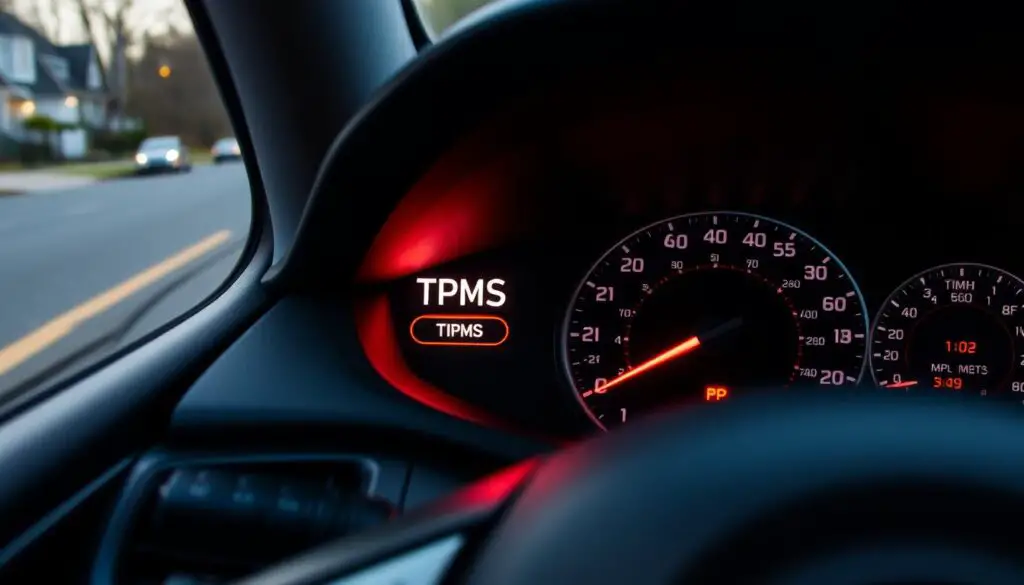
Keeping your Nissan Altima’s TPMS system in good shape is key to avoiding sudden issues. By sticking to regular maintenance and taking care of your tires, you can make sure they last longer. This also helps your TPMS sensors work better.
Regular Maintenance Tips
- Make sure to check the TPMS sensors regularly for any signs of wear.
- Keep your vehicle’s software updated to support the latest TPMS features.
- Get a professional to reset the TPMS system after replacing sensors or rotating tires.
- Look for any recalls or service bulletins about the Altima TPMS malfunction.
Best Practices for Tire Care
- Always keep your tires at the right pressure for accurate readings and best performance.
- Rotate your tires every 5,000 to 7,000 miles to ensure even wear and longer life.
- Do regular visual checks for any damage or excessive wear on your tires.
- Balance and align your wheels now and then to prevent uneven wear and reduce stress on the TPMS sensors.
By following these tips, you can greatly reduce the risk of an Altima TPMS malfunction. This keeps your vehicle safe and reliable for driving.
Impact of Tire Rotations on TPMS

Tire rotations are key for even wear, but they affect the Fixing TPMS error on Nissan Altima. When tires are moved, the TPMS sensors need to be updated to their new spots.
For instance, if a sensor is moved from the left front to the left rear without updating, it can cause problems. The system might still think the sensor is at the front. This can lead to errors if the sensor fails.
To fix these issues, follow these steps when rotating tires:
- Reprogram Sensors: After rotation, make sure each TPMS sensor is correctly updated to its new spot.
- Use a TPMS Tool: Special tools can help in updating sensors to their new locations.
- Consult a Professional: If you’re unsure, get help from a certified mechanic to avoid mistakes.
Correctly updating sensor registration helps in Fixing TPMS error on Nissan Altima. It also keeps tire pressure monitoring accurate. This boosts safety and vehicle performance.
Software Updates and TPMS Function
Keeping your Nissan Altima’s software up-to-date is key for the TPMS system’s best performance. Regular updates can make the system work better and fix TPMS error Nissan Altima problems that come up.
Dealer Update Process
Dealers are important for your TPMS to work right. Here’s what happens during an update:
- Diagnosis: Dealers use special tools to find any TPMS errors.
- Software Installation: New software is put in to make the system more accurate and quick.
- Recalibration: After the update, the TPMS is set up again to talk right with all sensors.
System Compatibility Issues
While updates are good, they can cause problems. It’s good to know about these issues:
- Sensor Mismatch: New software might not see older TPMS sensors, causing errors.
- Communication Glitches: Updates could mess with the TPMS’s talk with the ECU.
- Installation Errors: Wrongly installing updates can make TPMS problems worse.
Always talk to a certified Nissan dealer to make sure updates fit your Altima model. This helps avoid making TPMS error Nissan Altima problems worse.
Cost Considerations for TPMS Repairs
Fixing a Nissan Altima TPMS warning can cost a bit. Knowing these costs helps you plan your budget. This way, your car stays safe on the road.
There are a few main costs for TPMS repairs. These include replacing sensors, resetting the system, and getting a professional to diagnose the issue. Here’s a quick overview:
- Sensor Replacement: New TPMS sensors cost between $80 and $100 each. The exact price depends on your Altima’s model year and the sensor brand, like Schrader or Continental.
- System Resets: Resetting the TPMS system can cost between $50 and $150. This price varies based on the complexity and the service center’s rates.
- Professional Diagnostics: A diagnostic check to find the exact problem might cost around $100 to $200.
Several things can affect the total repair cost:
- Vehicle Model Year: Older models might need different sensors, which can change the cost.
- Labor Rates: Service center rates differ by location and the technician’s skill level.
- Sensor Type: OEM sensors from Nissan are pricier than aftermarket ones.
To save money, consider these tips:
- Regular Maintenance: Keeping your tires at the right pressure can prevent unnecessary TPMS warnings.
- Choose Quality Parts: Investing in reliable sensors like Ritesensor can save you money in the long run.
- Professional Installation: Using tools like the TECH600Pro ensures accurate sensor programming and system compatibility.
| Service | Estimated Cost (USD) |
|---|---|
| TPMS Sensor Replacement | $80 – $100 per sensor |
| System Reset | $50 – $150 |
| Professional Diagnostics | $100 – $200 |
| Total Estimated Cost | $230 – $450 |
Conclusion
Fixing TPMS errors in your Nissan Altima is key for safety and performance. Troubleshooting TPMS issues Altima means knowing common problems like low tire pressure and faulty sensors. Regular checks with a good gauge and sensor function tests can stop many issues.
Seeing TPMS warnings? Quick action, like resetting the system or getting expert help, can avoid costly repairs. Replacing bad sensors and regular tire rotations are crucial. Also, knowing how extreme weather affects tire pressure helps prevent alerts.
Knowing your Altima’s TPMS and following the maker’s advice improves your drive and safety. Whether you do it yourself or get help, taking care of your TPMS keeps your car running well and gives you peace of mind.
FAQ
What does the TPMS warning light indicate on my Nissan Altima?
How can I troubleshoot TPMS issues on my Altima?
What are the common causes of a TPMS error in a Nissan Altima?
How do temperature changes affect the TPMS readings in my Altima?
When should I replace the TPMS sensors in my Nissan Altima?
Can I reset the TPMS system on my Altima myself?
What is the difference between a solid and blinking TPMS light in my Altima?
How much does it cost to fix a TPMS error on a Nissan Altima?
Should I seek professional help for TPMS maintenance or attempt a DIY approach?
How often should I perform regular maintenance to prevent TPMS problems in my Altima?
What role do software updates play in maintaining the TPMS function in my Altima?
How do tire rotations affect the TPMS system in my Altima?
What are the legal requirements for TPMS in Nissan Altima vehicles?

Jack Thompson is a writer and seasoned auto mechanic with over 15 years of experience in the automotive industry. Known for his expertise in vehicle mechanics, Jack has a deep understanding of car and truck systems. His skills, honed through years of hands-on experience, have made him a trusted name in the field. Jack is committed to providing valuable insights into car maintenance and repair, helping vehicle owners keep their vehicles in top condition.

